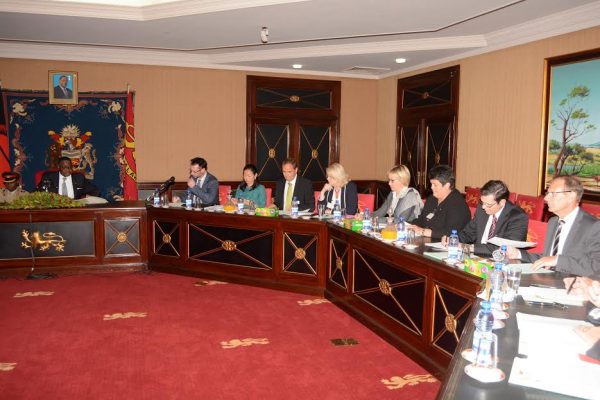Well, the shame of being Malawi, a poor nation, is that you live in perpetual subjection to entirely senseless but hegemonic ideas of the rich and powerful nations.

Donors holding talks with President Peter Mutharika
They decide while seated in air-conditioned comforts of their skyscrapers and, without a touch of understanding the context of their decision, impose their supreme will well aware that poor nations will have no option, but to submit.
This, I should admit, is the price we shall always pay for failing to build our economies.
Had we been sensible with our ways of political and economic governance, like China, we could have had the zeal to stand up and challenge these Western donors, disguised today as development partners, to give us a break.
We know from history that Western donors, using their economic advantage, have imposed awful policies on poor nations such as Malawi. The results of such policies, we all hold the truth, have done extremely well in deepening, not uplifting our poverty.
Because we are poor and helpless, so the donors find comfort, we cannot stand up to their increasing imposition of awful and senseless ideas. Because if we stand up, the way the late Bingu wa Mutharika did, they will cut their financial support.
Well, I know withholding financial support is their most trusted bullet to shoot and disable all of us to submission.
That is why, no matter how unpopular their full-board policy is among most Malawians, a consortium of donors is demanding Malawi Government to endorse the policy or risk aid withdrawal for the projects.
Should we, as a nation, be living in constant fear of not advancing what is good for us just because donors will cut their aid? Like seriously?
I argued, no long ago, how full-board will widen even further the gap between the rich and the poor and also kill mushrooming small-scale hospitality industries.
Full-board gives money to already rich and successful hotels. By not giving Duty Station Allowances (DSA) to a civil servant, it means the money remains with the rich hotel owners.
What suffers are all these small-scale businesses— lodged, eateries, groceries, minibuse , crafts industries, bottle stores— that get patronised with an extra-income for a civil servant with a DSA.
Further, the donors themselves argue that civil servants are shunning trainings because of full-board. I find this a vindication to them that full-board is unpopular.
The solution, therefore, is not for government to deepen the system by smoking out those who missed this or that training; rather, to abandon full-board and revert to DSA.
It is surprising to note that there has never been a systematic study to prove the wrongs of DSA in relation to full participation of civil servants in the donor-funded trainings.
I would not be wrong, therefore, to assume that the donors’ decision to change from DSA to full-board, as per their historical tradition, was purely a same old case of imposition.
In fact, I could only shudder to understand how His Excellency the German Ambassador Peter Woeste, without providing figures, could publicly declare that ‘many Malawians attend external events for the sake of receiving allowances’.
Such a generalisation, without facts, defeats even the slight truth embedded in his words. It is the least you would expect from a diplomat.
I shall, therefore, continue to challenge full board system.
In fact, among civil servant s and many other Malawians, it shall consistent l y remain shunned.
The solution is to sit down with government, with an open mind, and develop a system that works to the advantage of all the players involved. This traditional condition of attaching ‘withdrawal of financial support’ to every discussion defeats every word in the principles of development partners.